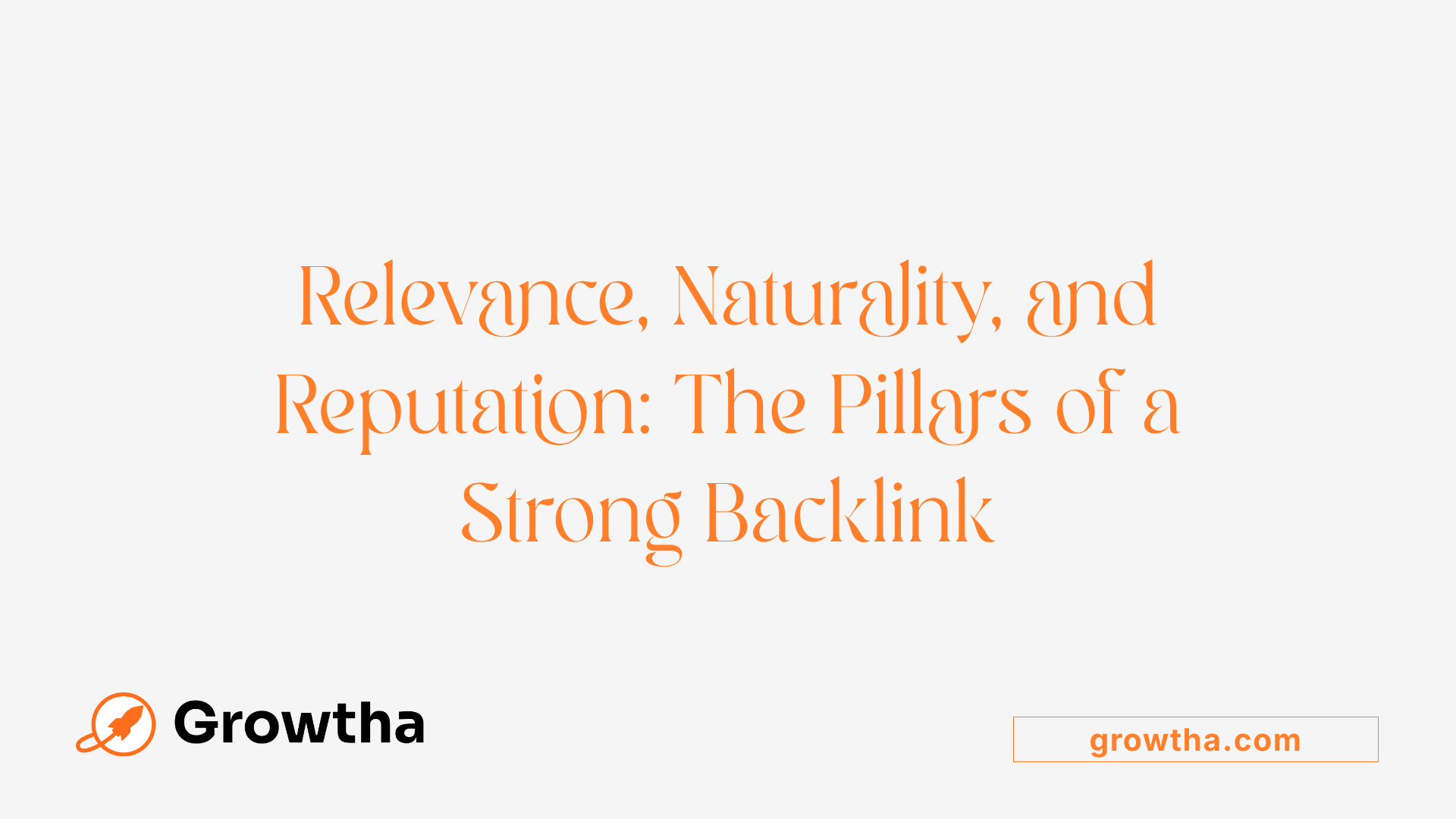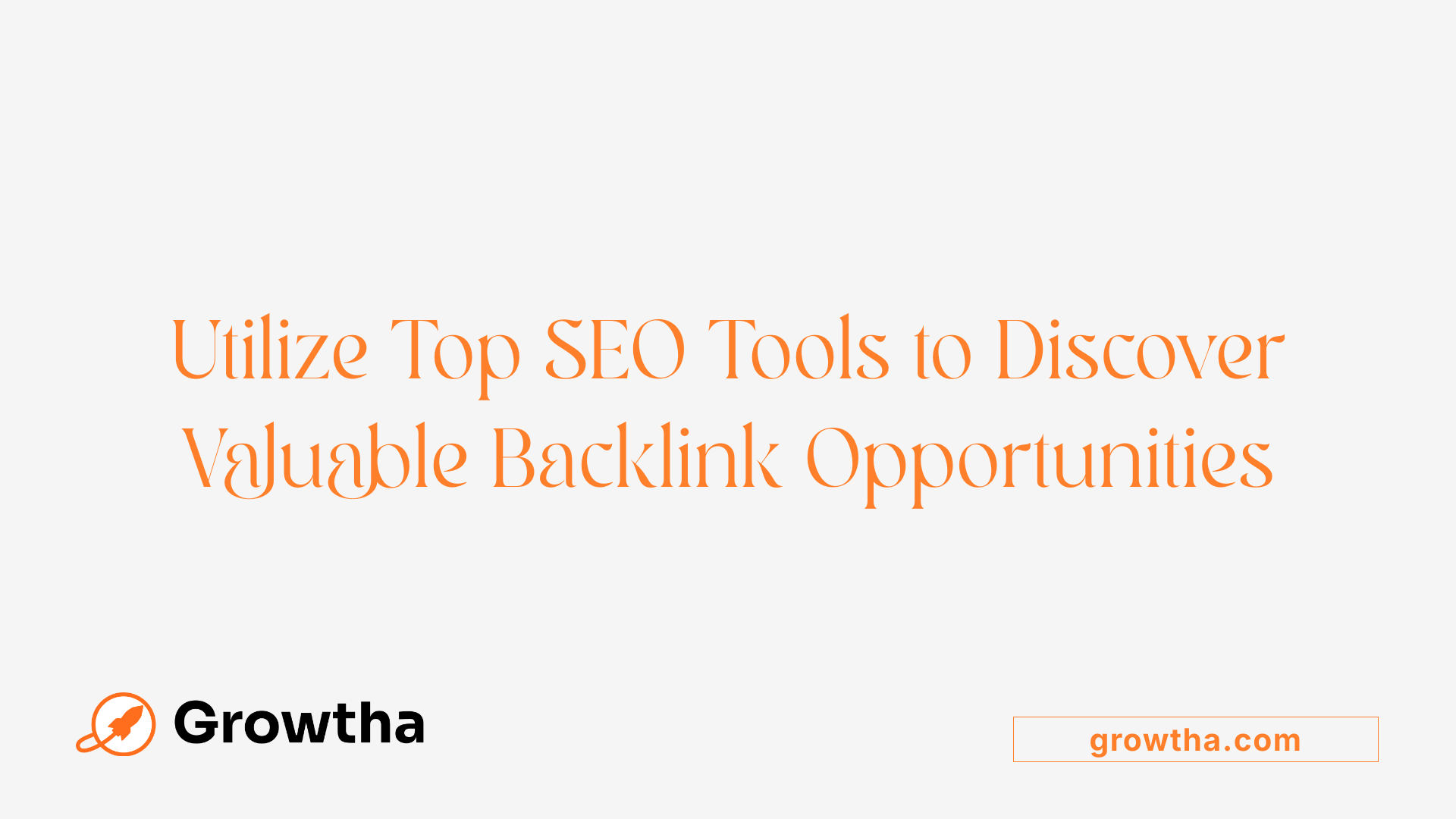How to Build Quality Backlinks for Medical Practices
Elevating Your Medical Practice’s Online Authority with Strategic Backlink Building


How to Build Quality Backlinks for Medical Practices
Understanding the Power of Backlinks in Healthcare SEO
In the competitive world of healthcare, establishing a strong online presence is crucial for attracting new patients and building trust. Central to effective healthcare SEO is the strategic development of high-quality backlinks. These backlinks serve as endorsements from reputable sites, signaling to search engines like Google that your practice is a trusted source of medical information. In this comprehensive guide, we explore the essential elements, effective methods, and best practices for building quality backlinks tailored specifically for medical practices.
Features of a Quality Backlink

What are the three main features of a quality backlink?
A strong, effective backlink has three essential characteristics: relevance, naturality, and reputation.
Relevance means that the backlink comes from a website or page closely related to healthcare. For example, a backlink from a reputable medical journal or healthcare organization signals to search engines that your content is aligned with trusted sources. This topical connection helps boost your site’s authority and rankings.
Naturality refers to how the backlink is obtained. High-quality backlinks are earned organically through valuable content and genuine relationships, not artificially through manipulative tactics like buying links. Natural links appear authentic and are more likely to be viewed as trustworthy signals.
Reputation involves the trustworthiness of the linking site. Backlinks from high-authority sites such as well-known health directories, medical institutions, or trusted news outlets pass more “link juice,” further elevating your own site’s credibility.
When these elements come together, they form the foundation of authoritative and impactful backlinks in healthcare. By focusing on relevance, naturality, and reputation, healthcare websites can improve their trustworthiness in the eyes of Google and patients alike. Indeed, search engines prioritize these high-quality signals to determine search rankings and industry authority.
Creating high-quality backlinks that exemplify relevance, naturality, and reputation is crucial for establishing online authority and trust in the competitive healthcare landscape. Regularly auditing backlink profiles to maintain these standards ensures sustained growth and visibility.
Strategies for Building High-Quality Backlinks

How can medical practices build high-quality backlinks?
Building strong backlinks is crucial for healthcare websites aiming to boost their online authority and search rankings. Medical practices can focus on creating content that is both valuable and engaging. This includes detailed guides, infographics, case studies, and tutorials that are informative and shareable, encouraging other reputable sites to link to them.
Establishing genuine relationships with industry peers, healthcare organizations, and medical bloggers can open opportunities for guest posting and collaborative content creation. Participating in health-focused forums, industry events, and community projects can also lead to local mentions and backlinks from community sites.
Another effective approach is to identify broken links on reputable healthcare websites and suggest your content as a replacement, turning a potential loss into a backlink opportunity. Conversely, monitoring unlinked brand mentions can help practices reach out and request the inclusion of their website, turning casual mentions into valuable links.
Promotion plays a key role; sharing high-quality content across social media platforms, email newsletters, and online communities increases visibility and the chance for organic backlinks.
Avoidance of unethical practices is essential. Practices such as buying links or using link farms violate search engine guidelines and can harm credibility and rankings. Instead, focusing on ethical, sustainable link-building strategies ensures long-term success and upholds professional integrity.
By consistently applying these tactics, healthcare providers can develop a diverse and authoritative backlink profile that signals trustworthiness and expertise to search engines and prospective patients alike.
Effective Methods for Acquiring Quality Backlinks
What are effective methods for acquiring quality backlinks for healthcare websites?
Building a strong backlink profile is essential for healthcare websites aiming to improve their search engine ranking and online authority. One highly effective approach involves creating high-quality, original content that is both informative and backed by research. Medical guides, detailed case studies, and evidence-based articles naturally attract backlinks from respected sources within the healthcare industry.
Collaborations and partnerships play a vital role as well. Establishing relationships with medical universities, healthcare organizations, and influential healthcare professionals can facilitate opportunities for guest posting, expert features, and mutual link exchanges. These authoritative links reinforce credibility and trustworthiness.
Outreach efforts should be targeted and strategic. Platforms like Help A Reporter Out (HARO) enable healthcare professionals to respond to journalistic queries, gaining exposure and valuable backlinks. Direct contact with relevant health bloggers, industry websites, and online health communities also helps secure links from reputable sources.
Developing engaging linkable assets is another key tactic. Tools like health calculators, symptom checkers, and comprehensive resource guides are highly shareable and tend to get linked organically by other sites seeking useful content for their audiences.
Local SEO strategies complement link building efforts. Listing on reputable health directories, engaging with local community organizations, sponsoring or participating in community health events, and being active on local forums can generate relevant backlinks from local websites. These local links significantly boost visibility in geographically targeted searches.
In summary, combining high-quality content creation, professional collaborations, targeted outreach, valuable asset development, and local engagement offers a comprehensive approach to acquiring valuable backlinks in the healthcare field. Employing these strategies enhances online authority, trust, and ultimately, search engine rankings.
The Role of Backlinks in Healthcare SEO
What role do backlinks play in healthcare SEO?
Backlinks are fundamental to enhancing a healthcare website’s SEO performance. They serve as digital endorsements from other reputable and trusted online sources. When high-quality, relevant websites link to a healthcare practice’s site, they signal to search engines like Google that the content is trustworthy and authoritative.
This recognition helps improve the site’s search rankings, making it more visible to potential patients. Moreover, backlinks from respected medical and health-related sources increase credibility, which builds trust with both search engines and users.
Creating a strong backlink profile involves several strategic steps. Producing high-quality, authoritative content naturally attracts backlinks. Guest posting on reputable healthcare platforms and collaborating with local organizations are also effective tactics. It’s equally important to avoid unethical practices like buying links, as these can lead to penalties.
Using tools like Ahrefs, SEMrush, or Moz to analyze and audit backlinks ensures the health and relevance of your link profile. Regularly monitoring link quality and seeking new opportunities helps maintain and improve search engine rankings.
In summary, a well-planned backlink strategy boosts a healthcare website’s authority and visibility. It helps distinguish practices in competitive search environments, enabling them to reach more patients and gain long-term trust.
Best Practices for Healthcare Backlink Building
What are some best practices for healthcare backlink building?
Building backlinks for healthcare websites requires a strategic, ethical approach that enhances both credibility and visibility. High-quality content is the cornerstone. Developing original, research-backed articles, patient education materials, and visually engaging assets naturally attracts backlinks from reputable sources.
Collaborating with respected organizations like medical universities, scientific journals, and local health groups can generate authoritative links relevant to your niche. These partnerships also boost your site’s credibility in the healthcare community.
Ethical outreach is crucial. Strategies such as guest posting on reputable medical sites, broken link building, and personalized email outreach help acquire diverse backlinks without violating search engine guidelines. This approach builds trust and maintains your site’s reputation.
Promoting your content through digital PR, healthcare directories, social media platforms, and interviews with experts extends your reach and increases the potential for backlinks. Engaging content that resonates with your audience encourages sharing and linking.
Finally, conducting regular backlink audits using tools like Ahrefs, SEMrush, or Moz ensures your profile remains healthy. Removing toxic links and disavowing spammy sources help uphold your website’s integrity and adhere to Google’s E-A-T (Expertise, Authority, Trustworthiness) principles.
Incorporating these best practices will aid healthcare providers in developing a robust, ethical backlink profile that improves search rankings and showcases their authority in the industry.
Understanding What Makes a Backlink High Quality
What makes a backlink high quality?
A high-quality backlink is an essential element in boosting a healthcare website’s online presence. It is characterized by several factors that ensure it contributes positively to search engine optimization (SEO). Generally, such backlinks come from relevant, high-authority websites that offer value to users and present content that aligns with your healthcare niche.
In practice, a good backlink is embedded naturally within high-quality, relevant content—this means it isn’t inserted artificially, but rather fits organically into the context of a well-written article, blog, or resource page. The anchor text, which is the clickable part of the link, should be descriptive and include target keywords, but used in a natural, non-spammy manner.
Another crucial aspect is the placement of the link on the page. Links situated within the main body of content are more valuable than those in footers or sidebars. The overall reputation of the linking site also plays a big role; reputable healthcare directories, authoritative medical sites, and community organizations are excellent sources.
Moreover, backlinks from sites with diverse IP addresses help prevent patterns that could look manipulative. The site’s traffic, trustworthiness, and the absence of spam signals are vital indicators of quality. Building such backlinks is a strategic process that involves producing valuable, shareable content, engaging in outreach efforts, and conducting regular audits to maintain adherence to best practices.
Avoiding manipulative methods like paid or spammy links is critical—Google penalizes sites that violate its guidelines. Instead, focus on genuine engagement, such as guest posting, collaborating with healthcare professionals, and developing linkable assets like informative articles, case studies, or health calculators. These practices help create a natural, robust backlink profile that enhances your healthcare website’s credibility and search rankings.
Tools and Resources to Identify Link Opportunities

Are there resources or tools to find backlink providers or services?
Yes, there are many helpful tools that can assist healthcare websites in discovering and securing quality backlinks to boost their Search Engine Optimization (SEO). Popular SEO platforms like Ahrefs, SEMrush, and Moz provide comprehensive backlink analysis features.
Ahrefs and SEMrush are especially known for their ability to analyze competitor backlinks, identify high-value linking domains, and find potential backlink opportunities. These tools allow users to see which sites are linking to competitors and to evaluate the quality and relevance of those links.
Moz offers its own Link Explorer tool, which helps assess the authority of linking websites and find new link prospects by examining existing backlink profiles.
In addition to these analytics tools, outreach platforms such as PitchBox, BuzzStream, and LinkResearchTools streamline the process of connecting with potential backlink sources. They facilitate the management of outreach campaigns, track responses, and help build relationships with relevant websites.
Using these tools, healthcare sites can monitor their backlink profile, discover authoritative sites within the industry, and plan targeted outreach strategies. This proactive approach helps in acquiring high-quality backlinks that enhance site authority and improve search rankings.
Effective backlink prospecting combines detailed analysis and strategic outreach, enabling healthcare practices to build a robust backlink profile and increase visibility.
| Tool Name | Main Features | Suitable For |
|---|---|---|
| Ahrefs | Backlink analysis, competitor research, site audits | Detailed backlink prospects analysis |
| SEMrush | Backlink gap analysis, auditing, outreach tools | Competitor comparison, keyword + backlink analysis |
| Moz Link Explorer | Assessing domain authority, backlink discovery | Finding relevant link sources |
| PitchBox, BuzzStream | Outreach management, relationship building | Outreach campaign execution |
| LinkResearchTools | Advanced link analysis, toxicity checks | Backlink quality control |
Employing these resources can significantly improve your ability to find reputable backlink opportunities, ultimately elevating your healthcare website's authority and search presence.
Improving Your Backlink Profile with Local SEO
How can healthcare providers improve their backlink profiles?
Healthcare providers can enhance their backlink profiles through multiple strategies focusing on quality and relevance. Creating high-quality, authoritative content like articles, infographics, and videos naturally attracts backlinks from reputable sources. These valuable resources give other websites a reason to link back, boosting credibility and search engine rankings.
Engaging in targeted outreach efforts such as guest blogging, digital public relations, and collaborations with healthcare influencers and local organizations further helps secure backlinks from trusted sites. Building relationships within the local healthcare community can lead to backlinks from local news outlets, community boards, and regional directories.
Regularly auditing your backlink profile using tools like SEMrush, Ahrefs, or Moz is vital. These audits help identify and remove harmful or spammy links that could harm your SEO efforts. Maintaining a clean, high-quality backlink profile ensures ongoing visibility and trustworthiness.
Optimizing technical SEO components—such as website speed, mobile responsiveness, and structured data—complements backlink efforts. Focusing on local SEO elements, like Google My Business, local directories, and citation consistency, enhances local search visibility when earning backlinks from community-based websites.
Leveraging AI tools and automation can make continuous link-building more efficient. Automating outreach, monitoring backlinks, and analyzing competitors’ profiles can streamline efforts and help establish a powerful, reliable backlink foundation.
Strategies for local SEO and backlinks
| Strategy | Description | Purpose |
|---|---|---|
| Local directories | Listing your practice in reputable local directories ensures visibility and backlinks from relevant sources. | Enhance local SEO; boost local authority |
| Community engagement | Participating in community events and sponsoring local initiatives fosters relationships and earns backlinks. | Build trust and backlinks from local sites |
| Consistent NAP practice | Maintaining accurate Name, Address, Phone across all profiles and directories ensures uniformity, which Google favors. | Improve local rankings; credibility |
| Google My Business optimizations | Regular updates, reviews, and verification of your GMB profile maximize local presence. | Increase local visibility; generate backlinks |
By integrating these strategies, healthcare providers can significantly strengthen their backlink profiles while improving their local SEO presence, ultimately attracting more nearby patients and establishing a reputable online presence.
Monitoring, Analyzing, and Maintaining Your Backlink Profile
What tools are available to help monitor and analyze backlinks?
Various SEO tools can assist healthcare practices in tracking and evaluating their backlink profiles. Platforms like Ahrefs, SEMrush, Moz, and Ubersuggest provide in-depth backlink analysis features, showing the number of backlinks, referring domains, anchor text distribution, and the authority of linking sites. These tools help identify which backlinks are contributing positively and which may harm the site's reputation.
How do backlink audits support ongoing SEO efforts?
Regular backlink audits are essential for maintaining a healthy link profile. They help detect low-quality, Spammy, or toxic links that could negatively impact search rankings. Removing or disavowing harmful backlinks ensures that your website’s authority remains strong. Auditing also reveals new backlink opportunities and assesses the effectiveness of previous link-building initiatives.
How can continuous improvement be achieved through backlink management?
Consistently monitoring your backlink profile allows healthcare providers to adapt their strategies based on current performance. By analyzing metrics such as domain authority, trust flow, and the diversity of referring domains, practices can focus on acquiring high-quality links from reputable sources. Engaging in ongoing outreach, creating shareable content, and collaborating with local organizations help sustain and improve link quality.
Are there resources or tools to find backlink providers or services?
Yes, there are numerous resources and tools available to find backlink providers or services. Popular SEO tools like Semrush, Ahrefs, Moz Link Explorer, and Ubersuggest offer backlink analysis, prospecting, and competitor comparison features that help identify potential link building opportunities. Additionally, specialized outreach and link management platforms such as PitchBox, BuzzStream, and LinkResearchTools facilitate the discovery of backlink providers and streamline outreach efforts. These tools provide comprehensive backlink data, enabling users to monitor, evaluate, and acquire quality backlinks effectively. Overall, leveraging these resources can significantly enhance your backlink strategies and SEO performance.
Conclusion and Ongoing Strategy Development
Building a robust backlink profile for healthcare websites is an ongoing process that requires consistent effort and strategic updates. Healthcare providers should focus on creating high-quality, relevant content—such as in-depth articles, infographics, and engaging videos—that naturally attracts reputable backlinks.
Targeted outreach remains a vital tool. This includes guest blogging on reputable health platforms, engaging in digital PR campaigns, and collaborating with healthcare influencers or local organizations. These efforts help secure authoritative links, strengthen site credibility, and improve search engine rankings.
Regular backlink audits using tools like SEMrush, Ahrefs, or Moz can identify the quality and relevance of existing links. Removing or disavowing harmful or spammy links ensures the integrity of the backlink profile.
Optimizing technical aspects of your healthcare website—such as improving site speed, ensuring mobile responsiveness, maintaining accurate local listings, and leveraging structured data—further enhances local SEO and backlinks from community sites.
Automation tools and AI technology can assist in streamlining outreach campaigns, tracking new opportunities, and maintaining the quality of the backlink profile, making efforts more efficient.
By staying aligned with best practices and continuously refining strategies, healthcare providers can effectively grow their backlink profiles, boost online visibility, and ultimately attract more local patients.
Sustaining and Growing Your Healthcare Backlink Profile
Building and maintaining a healthy backlink profile is a continuous process that requires regular effort and strategic planning. By consistently creating high-quality, relevant content, engaging with reputable healthcare authorities, and leveraging advanced SEO tools, medical practices can reinforce their online authority and improve search engine rankings. Staying updated with the latest SEO guidelines and avoiding black-hat tactics ensures long-term success. Lastly, integrating local SEO strategies and monitoring backlink health through regular audits will help practices sustain their online credibility, attract more patients, and grow their reputation in the healthcare community.
References
- How To Get It Right: Link Building For Healthcare Industries
- SEO for Doctors: 11 SEO Strategies Specific to Medical Practices
- SEO for healthcare: How to boost your medical practice's organic traffic
- How to Build Backlinks to Your Healthcare Website | MOXY Company
- Why Does Leveraging Backlinks In Medical SEO Matter?
- How can We Get a Quality Backlink for a Health Site? - Asclique
- SEO Best Practices for Healthcare & Wellness: Rank & Grow







